
Caption
Commissioner Kevin Tanner said he sees funding a rate study’s recommendations as “the first step in several to correct the workforce issue.” Others say the funding falls short of what’s needed.
Credit: Jill Nolin/Georgia Recorder

Commissioner Kevin Tanner said he sees funding a rate study’s recommendations as “the first step in several to correct the workforce issue.” Others say the funding falls short of what’s needed.
Workers who assist people with disabilities would receive about a $5-per-hour salary increase if decision-makers heed the recommendations packed into an ongoing wage review.
The increase would cost the state about $91 million and lift the hourly wage of caregivers to $15.18, up from $10.63, according to cost estimates released Thursday by the state Department of Behavioral Health and Developmental Disabilities.
Commissioner Kevin Tanner argues that implementing the rate study is essential to shoring up the safety net in Georgia and providing services to more people with disabilities. He told reporters this week that he sees it as “the first step in several to correct the workforce issue.”
His staff outlined the study’s recommendations for the agency’s advisory board Thursday.
“I will tell you that if we don’t implement the rate increases, we’re not going to have providers to provide the services,” Tanner told the board.
But service providers, who have wrestled with staffing shortages that predate the pandemic, say such an increase – while appreciated – would fall short of what is needed to address the crisis at a time of rising costs.
“We can’t hire anyone at $15. There’s no one in the state that can hire someone at $15 an hour. Our concern is that if we don’t get that right now, we could potentially live with that $15.18 for another decade or more,” said Diane Wilush, president and CEO of United Cerebral Palsy of Georgia.
“We can all talk about how important our (workers) are and how valued they are and how everybody appreciates them, but none of that pays for their groceries,” she said.
Wilush, who is also a board member with the Service Providers Association for Developmental Disabilities, argues the state should bring the rate up to at least $18.86 – which would put Georgia’s pay in the 75th percentile nationally. She also raised concerns about proposed changes to how the state funds day programs.
The staffing shortage has hamstrung efforts to connect more people with intellectual and developmental disabilities with home- and community-based services available through Medicaid.
There are more than 7,000 people on the waiting list for those government-funded services, and lawmakers cautiously increased the number of slots last year partly because of the difficulty people are having finding caregivers.
A bipartisan Senate panel has proposed funding services for another 2,400 people next year. For now, the governor’s budget proposal has proposed funding another 250 slots.
Under a new law passed last year, the state must do a rate review every few years. Tanner argues that will help ensure direct-support professionals are paid a livable wage, but providers counter that a regular review does not guarantee consistent rate increases since it’s still up to lawmakers to fund the raises.
The rate study, which is Georgia’s first comprehensive wage review in more than a decade, has not been finalized. The department and the outside firm doing the study are in the process of reviewing the 500 or so public comments received.
Once DBHDD settles on a final rate plan, the proposal will then move over to the state Department of Community Health for more public input and consideration before being submitted to the federal government. It could be sometime next year before workers see the increased pay.
DBHDD officials say the proposal would represent a 38% overall increase for providers.
The total cost to make the proposal a reality would be $267 million, with the federal government picking up about two-thirds of the tab.
Tanner told reporters he hopes to persuade lawmakers to at least partially fund the $91 million plan in the new state budget that takes effect this July. Lawmakers are starting to work on next year’s $32.4 billion spending plan now.
Tanner says he thinks the $5-per-hour increase will have a “dramatic” impact on the staffing shortage.
“Overall, a 40% increase in provider rates is going to have a significant impact. Is it the silver bullet? No. Part of the answer to the workforce challenges is well beyond just provider rates,” he said.
It’s also important, he said, to offer loan forgiveness and develop other strategies to encourage young people or those looking for a second career to consider this field as an option.
Others are not convinced the rate increases will have much impact.
“I am just wondering how much throwing money at it will actually work,” Amanda Owens, a member of the agency’s board said at the Thursday meeting. “I think this is a great step. I’m just concerned that it’s not going to actually work.”
This story comes to GPB through a reporting partnership with Georgia Recorder.